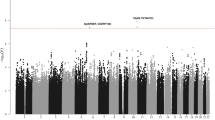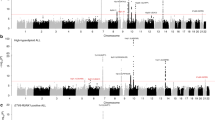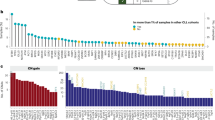Abstract
Elucidating resistance mechanisms for therapeutic monoclonal antibodies (MAbs) is challenging, because they are difficult to study in non-human models. We therefore developed a strategy to genetically map in vitro drug sensitivity, identifying genes that alter responsiveness to rituximab, a therapeutic anti-CD20 MAb that provides significant benefit to patients with B-cell malignancies. We discovered novel loci with genome-wide mapping analyses and functionally validated one of these genes, CBLB, which causes rituximab resistance when knocked down in lymphoma cells. This study demonstrates the utility of genome-wide mapping to discover novel biological mechanisms of potential clinical advantage.
This is a preview of subscription content, access via your institution
Access options
Subscribe to this journal
Receive 6 print issues and online access
$259.00 per year
only $43.17 per issue
Buy this article
- Purchase on Springer Link
- Instant access to full article PDF
Prices may be subject to local taxes which are calculated during checkout





Similar content being viewed by others
References
Shuptrine CW, Surana R, Weiner LM . Monoclonal antibodies for the treatment of cancer. Semin Cancer Biol 2012; 22: 3–13.
Ng KP, Hillmer AM, Chuah CTH, Juan WC, Ko TK, Teo ASM et al. A common BIM deletion polymorphism mediates intrinsic resistance and inferior responses to tyrosine kinase inhibitors in cancer. Nat Med 2012; 18: 521–528.
Turner NC, Reis-Filho JS . Genetic heterogeneity and cancer drug resistance. Lancet Oncol 2012; 13: e178–e185.
Lee AJX, Swanton C . Tumour heterogeneity and drug resistance: personalising cancer medicine through functional genomics. Biochem Pharmacol 2012; 83: 1013–1020.
Gonzalez de Castro D, Clarke PA, Al-Lazikani B, Workman P . Personalized cancer medicine: molecular diagnostics, predictive biomarkers, and drug resistance. Clin Pharmacol Ther 2013; 93: 252–259.
Glennie MJ, French RR, Cragg MS, Taylor RP . Mechanisms of killing by anti-CD20 monoclonal antibodies. Mol Immunol 2007; 44: 3823–3837.
Weng W-K, Levy R . Two immunoglobulin G fragment C receptor polymorphisms independently predict response to rituximab in patients with follicular lymphoma. J Clin Oncol 2003; 21: 3940–3947.
Cartron G, Dacheux L, Salles G, Solal-Celigny P, Bardos P, Colombat P et al. Therapeutic activity of humanized anti-CD20 monoclonal antibody and polymorphism in IgG Fc receptor FcgammaRIIIa gene. Blood 2002; 99: 754–758.
Mellor JD, Brown MP, Irving HR, Zalcberg JR, Dobrovic A . A critical review of the role of Fc gamma receptor polymorphisms in the response to monoclonal antibodies in cancer. J Hematol Oncol 2013; 6: 1.
Racila E, Link BK, Weng W-K, Witzig TE, Ansell S, Maurer MJ et al. A polymorphism in the complement component C1qA correlates with prolonged response following rituximab therapy of follicular lymphoma. Clin Cancer Res 2008; 14: 6697–6703.
Medina MW, Gao F, Ruan W, Rotter JI, Krauss RM . Alternative splicing of 3-hydroxy-3-methylglutaryl coenzyme A reductase is associated with plasma low-density lipoprotein cholesterol response to simvastatin. Circulation 2008; 118: 355–362.
Barber MJ, Mangravite LM, Hyde CL, Chasman DI, Smith JD, McCarty CA et al. Genome-wide association of lipid-lowering response to statins in combined study populations. PLoS ONE 2010; 5: e9763.
Li Y, Willer C, Sanna S, Abecasis G . Genotype imputation. Annu Rev Genomics Hum Genet 2009; 10: 387–406.
Brown CC, Havener TM, Medina MW, Jack JR, Krauss RM, McLeod HL et al. Genome-wide association and pharmacological profiling of 29 anticancer agents using lymphoblastoid cell lines. Pharmacogenomics 2014; 15: 137–146.
Laurie CC, Doheny KF, Mirel DB, Pugh EW, Bierut LJ, Bhangale T et al. Quality control and quality assurance in genotypic data for genome-wide association studies. Genet Epidemiol 2010; 34: 591–602.
Price AL, Patterson NJ, Plenge RM, Weinblatt ME, Shadick NA, Reich D . Principal components analysis corrects for stratification in genome-wide association studies. Nat Genet 2006; 38: 904–909.
HGDP-CEPH Human Genome Diversity Cell Line Panel. 2016 (cited 1 January 2015). Available from http://www.cephb.fr/en/hgdp_panel.php.
Marshfield Genetic Map Mammalian Genotyping Service. 1995. 2006. Available from http://research.marshfieldclinic.org/genetics/home/index.asp.
Watters JW, Kraja A, Meucci MA, Province MA, McLeod HL . Genome-wide discovery of loci influencing chemotherapy cytotoxicity. Proc Natl Acad Sci USA 2004; 101: 11809–11814.
Peters EJ, Motsinger-Reif A, Havener TM, Everitt L, Hardison NE, Watson VG et al. Pharmacogenomic characterization of US FDA-approved cytotoxic drugs. Pharmacogenomics 2011; 12: 1407–1415.
Demeure O, Lecerf F . MarkerSet: a marker selection tool based on markers location and informativity in experimental designs. BMC Res Notes 2008; 1: 9.
Abecasis GR, Cherny SS, Cookson WO, Cardon LR . Merlin—rapid analysis of dense genetic maps using sparse gene flow trees. Nat Genet 2002; 30: 97–101.
Yang J, Lee SH, Goddard ME, Visscher PM . GCTA: a tool for genome-wide complex trait analysis. Am J Hum Genet 2011; 88: 76–82.
Brown CC, Havener TM, Medina MW, Krauss RM, McLeod HL, Motsinger-Reif AA . Multivariate methods and software for association mapping in dose-response genome-wide association studies. BioData Min 2012; 5: 21.
Che R, Jack JR, Motsinger-Reif AA, Brown CC . An adaptive permutation approach for genome-wide association study: evaluation and recommendations for use. BioData Min 2014; 7: 9.
Snow GL, Wijsman EM . Pedigree analysis package (PAP) vs. MORGAN: model selection and hypothesis testing on a large pedigree. Genet Epidemiol 1998; 15 (4): 355–369.
Akaike H . A new look at the statistical model identification. IEEE Trans Automat Contr 1974; 19: 716–723.
Small GW, McLeod HL, Richards KL . Analysis of innate and acquired resistance to anti-CD20 antibodies in malignant and nonmalignant B cells. PeerJ 2013; 1: e31.
Pe’er I, Yelensky R, Altshuler D, Daly MJ . Estimation of the multiple testing burden for genomewide association studies of nearly all common variants. Genet Epidemiol 2008; 32: 381–385.
Duggal P, Gillanders EM, Holmes TN, Bailey-Wilson JE . Establishing an adjusted p-value threshold to control the family-wide type 1 error in genome wide association studies. BMC Genomics 2008; 9: 516.
Davis TA, Czerwinski DK, Levy R . Therapy of B-cell lymphoma with anti-CD20 antibodies can result in the loss of CD20 antigen expression. Clin Cancer Res 1999; 5: 611–615.
Foran JM, Norton andrew J, Micallef INM, Taussig DC, Amess JAL, Rohatiner AZS et al. Loss of CD20 expression following treatment with rituximab (chimaeric monoclonal anti-CD20): a retrospective cohort analysis. Br J Haematol 2001; 114: 881–883.
Kennedy GA, Tey S-K, Cobcroft R, Marlton P, Cull G, Grimmett K et al. Incidence and nature of CD20-negative relapses following rituximab therapy in aggressive B-cell non-Hodgkin’s lymphoma: a retrospective review. Br J Haematol 2002; 119: 412–416.
Pawluczkowycz AW, Beurskens FJ, Beum PV, Lindorfer MA, van de Winkel JGJ, Parren PWHI et al. Binding of submaximal C1q promotes complement-dependent cytotoxicity (CDC) of B cells opsonized with anti-CD20 mAbs ofatumumab (OFA) or rituximab (RTX): considerably higher levels of CDC are induced by OFA than by RTX. J Immunol 2009; 183: 749–758.
Golay J, Manganini M, Facchinetti V, Gramigna R, Broady R, Borleri G et al. Rituximab-mediated antibody-dependent cellular cytotoxicity against neoplastic B cells is stimulated strongly by interleukin-2. Haematologica 2003; 88: 1002–1012.
Dall’Ozzo S . Rituximab-dependent cytotoxicity by natural killer cells: influence of FCGR3A polymorphism on the concentration-effect relationship. Cancer Res 2004; 64: 4664–4669.
Weinstein JN, Lorenzi PL . Cancer: discrepancies in drug sensitivity. Nature 2013; 504: 381–383.
Acknowledgements
This work was supported a Mentored Research Scholar Grant in Applied and Clinical Research (MSRG-12-086-01-TBG) from the American Cancer Society, an R01 Grant (5R01 CA185372) from the National Cancer Institute to KLR and an RO1 (5R01CA161608) from the National Cancer Institute to AMR and HLM.
Author information
Authors and Affiliations
Corresponding authors
Ethics declarations
Competing interests
The authors declare no conflict of interest.
Additional information
Supplementary Information accompanies the paper on the The Pharmacogenomics Journal website
Supplementary information
Rights and permissions
About this article
Cite this article
Jack, J., Small, G., Brown, C. et al. Gene expression and linkage analysis implicate CBLB as a mediator of rituximab resistance. Pharmacogenomics J 18, 467–473 (2018). https://doi.org/10.1038/tpj.2017.41
Received:
Revised:
Accepted:
Published:
Issue Date:
DOI: https://doi.org/10.1038/tpj.2017.41



